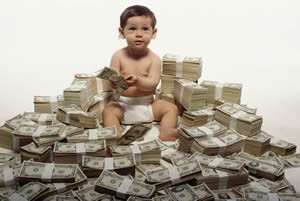RI’s Baby Bust: Poor Economy Forced Birth Rates to Decline
Tuesday, October 18, 2011
Rhode Island had the third-lowest birth rate (per thousand) in the nation in 2009, a statistic that coincides with a sharp decline in fertility rates nationally during the recession, according to the Pew Research Center.
At a rate of 53.62 (per thousand women ages 15-44), 11,443 children were born in the state in 2009, by far the lowest number in at least a decade. By comparison, in 2003, 13,209 children born in the Ocean State at rate of 56.99 (per thousand women ages 15-44).
According to the analysis, states experiencing the largest economic declines in 2007 and 2008 were most likely to experience relatively large fertility declines from 2008 to 2009. But states that didn’t experience as much of an economic decline didn’t see as much of a decline in birth rates.
GET THE LATEST BREAKING NEWS HERE -- SIGN UP FOR GOLOCAL FREE DAILY EBLASTMost States Saw Declines During Recession
Nationally, the birth rate has been on the decline since 2007 when about 4.32 million babies were born. Preliminary numbers for 2010 suggest that 4.01 million children were born, the lowest number in at least ten years.
Rhode Island was among the hardest-hit states by the recession and recent reports suggest the economic recovery is stalling despite an unemployment rate that hovers at 10.6 percent. Pew’s research connected the decline in birth closely with the decline of the economy near the end of 2008,
“In 48 of 51 states (a number that includes the District of Columbia), fertility declines occurred within one to two years of the start of economic declines (as indicated by the percent change in personal income per capita, and the percent change in the employment rate),” the report said. “This does not conclusively prove that the economic changes led to fertility changes. However, the timing is consistent with the time it might take people to act upon fertility decisions.”
Hispanics the Hardest Hit
According the U.S. Census, Rhode Island’s Latino population grew by more than 40 percent over the last decade. But Pew’s research found that members of the Hispanic community saw the largest declines in birth rates among racial and ethnic groups in the country.
Pew suggests the reason is because the Latino community was hit particularly hard by the declining economy.
“Hispanics, whose employment levels and household wealth were particularly hard hit by the Great Recession, have experienced the largest fertility declines of the nation’s three major racial and ethnic groups,” the report said. “Conversely, whites have experienced smaller economic hardships, and smaller declines in fertility. From 2008 to 2009, birth rates dropped by 5.9% among Hispanic women, while birth rates dropped 2.4% among black women and 1.6% among white women.”
The Outlook
Pew also found that one of the reasons for the sharp decline was that some women made the decision to postpone their pregnancies, but the report cites evidence that suggests woment aren't simply making a decision to have fewer children.
Still, the question remains whether fertility numbers will increase as the economy recovers. Pew’s report suggested it is too early to tell.
“It’s too early to know if fertility will bounce back as the U.S. economy recovers, but preliminary evidence suggests that the fertility decline may indeed be driven by postponement,” the report said. “Survey findings from the Pew Research Center and vital statistics data have shown that the recession is more strongly associated with fertility declines among younger women, who presumably have the luxury of postponing fertility until better economic times prevail. Conversely, older women are less likely to say that they have postponed fertility due to economic declines. They are the only age group that has shown consistent, if not rising, fertility in recent years.”
If you valued this article, please LIKE GoLocalProv.com on Facebook by clicking HERE.



